Change: A Wide Ranging Conversation
A prophet once said: you can change your hair and you can change your clothes. You can change your mind, that’s just the way it goes.
As you can probably tell, I’ve been a little hyper-fixated on change as of late—how we create it, how it happens to us, and how we learn to live with it if not, optimistically, even like it a little. So I was very excited when today’s guest asked me if we could talk about change versus the other way around.
Not only that but she dove in headfirst and had so much to share, which is why this week is one where I’m going to keep my side chat to a minimum to let Ruby Wiener’s thoughts speak primarily for themselves. Today’s piece is a little cerebral at times though never hard to follow so long as you’re down to come with us for the ride.
Ruby is a lover of the NYT Daily Mini, a side of honey mustard, improv comedy, and Gabriel Garcia Marquez. She is a budding physician and marathoner, AMC Stubs A-list member, and reluctant lifelong Jets fan.
Ruby’s note: John Mulaney’s drug-induced interview with GQ is called a wide-ranging conversation and I feel the title would apply to this interview, sans drugs—sorry and happy reading.
Free Your Mind and the Rest Will Follow
Ruby and I began discussing today’s topic over margaritas which is where most of my favorite conversations tend to take place. She was telling me about how she was getting ready to start medical school this fall and how she’d had a number of mindset shifts in the process—chief among them being the realization that she had the power to always shift her mindset.
I wanted to start today’s chat there and asked:
Emily: Did you have to change your mind about the power of changing your mind, or was this something you had not thought about previously?
Ruby: I am not so prone to big decisions and have ended up where I am as a result of an infinite number of small ones that seemed insignificant at the time. Maybe all big decisions are really small ones and you’re just too close to the thing to see. I think Jason Sudeikis said about his breakup, that this year he understands a little about it and in 5 years he will know even more.
There have definitely been periods of my life where I was stuck in the mindset that I was “trapped” in a track (career, relationships, hobbies). Even if it doesn’t completely change my actions or decisions, changing the mentality lets me approach the career, relationship, hobby knowing I am not stuck and that makes all the difference.
Right now, you’re maybe too close to the situation to see it, but in 5 years you’ll realize how unstuck you really were, and in 10 years you’ll realize you were never stuck at all.
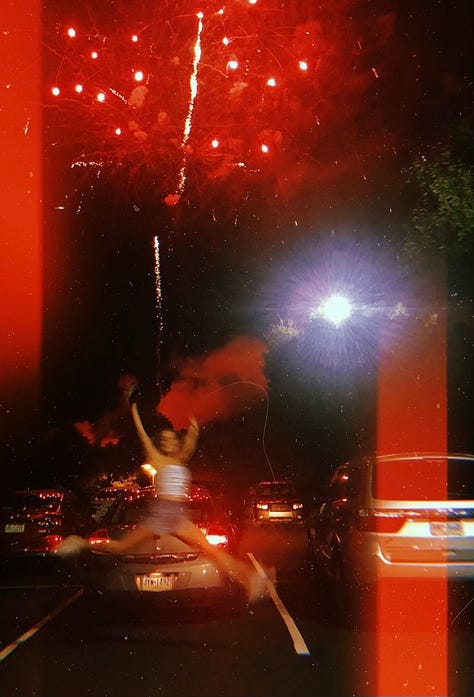
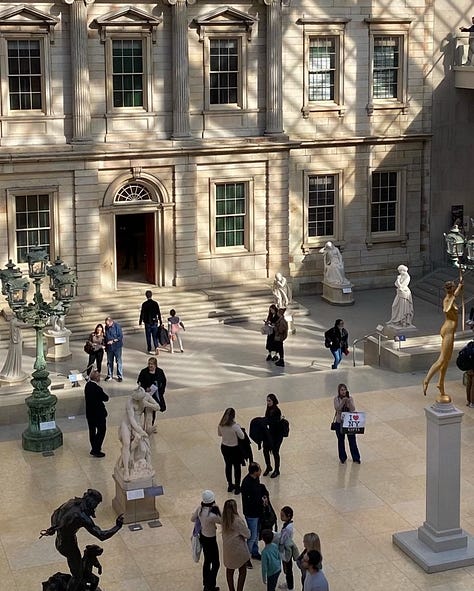
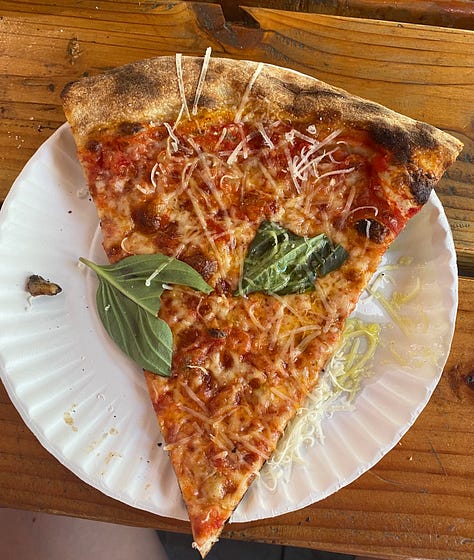
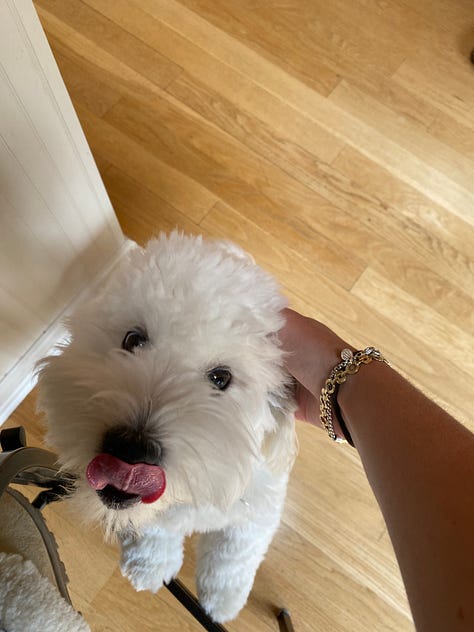
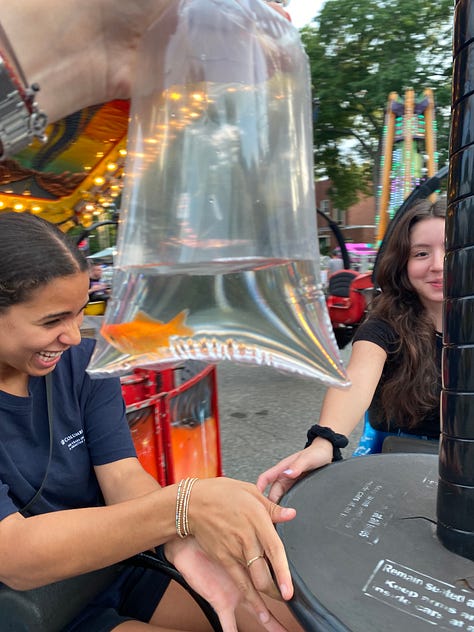

Emily: Which resources, if any, helped you start taking a more open-ended approach to life?
Ruby: I think having an August birthday helps because I can tell myself I have more time to change my mind since I’m younger than other people my age (reverse paraphrased Yogi Berra). Sometimes the “stuck”-ness comes from thinking if you switch now, you will be behind, so just remember you’re younger than others so you have more time. I think you can do that no matter when your birthday is.
Also, I have a vision of myself as a grandmother who owns a bakery that only sells banana bread and cookies in a lake town and figure I can always end up there somehow, and the how doesn’t matter quite so much. I definitely should not be giving out advice if my philosophies on life are just hyperbolic bits, so this is not advice, just what goes on in my brain, among other things.
Emily: I've talked here before with others about how scary change can be, despite often seeing it as inevitable. Has this approach lifted any of the fear of making changes in your life?
Ruby: In middle school, I played the saxophone in the band and one day we had a field trip to Dorney Park to play there for like 20 minutes and then ride roller coasters the rest of the day. I had never been on a big roller coaster before and I was scared, and also it was cold which was a factor at the time, and I didn’t want to be scared and cold with the middle school band so I asked my mom to pick me up, but she was busy so I had to wait a while for her to get there.
Obviously, the cool band kids rushed to the biggest roller coaster in the park. I ended up going on it and I actually had a fantastic time. And, more importantly, riding roller coasters warms you up—who knew? But then my mom got there and I had to leave even though I was now having fun and warm. Lesson learned.
Fear sometimes keeps you from doing stupid stuff—I think that’s evolution. But don’t disregard your own agency in bringing about changes to your own life. It’s really very easy not to do things. Remember you are doing the thing because you want to and you worked for it and you probably did a lot of the steps already. Inevitable change is rare—even something like graduating, which may seem inevitable, is actually something you worked pretty hard towards.
Remember all those months and moons ago when I had the bright idea of Googling the question, “Why are people scared of change?” and found that
neuroscience research teaches us that uncertainty registers in our brain much like an error does. It needs to be corrected before we can feel comfortable again, so we'd rather not have that hanging out there if we can avoid it.
We also fear change because we fear that we might lose what's associated with that change. Our aversion to loss can even cause logic to fly out the window (X).
Ruby has seemingly managed to circumvent the fear typically associated with change by rejecting this element of loss the rest of us knowingly or unknowingly knit in so tightly. For those of you who don’t know Ruby offline, she is boisterous and bubbly in the best way. She attracts people and experiences to her like a magnet, and spending just five minutes with her can immediately improve your bad mood.
I’ve been thinking about these facts alongside my still-ongoing attempts to process Sara Delgado’s first E4P appearance in which I asked a very niche version of the following question: Why do you think high-achieving women in particular are so hesitant to make the necessary changes needed to make their lives more sustainable?
Knowing what I know about Ruby in addition to knowing what I know now about change and happiness and life (Jesus take the wheel) that I didn’t last November, I wanted to broaden the scope of the question and ask:
Emily: Why do you think it seems harder than it is for us to make the changes that might make us the happiest? How do you think it all changes with age?
Ruby: This is not a direct answer to your question but here are my thoughts. My 22-year old-self thinks that happiness is an in-the-moment thing, so you’ll never know which life path or decision will make you happier until you’re really doing it.
Here is an excerpt from BJ Novak’s book about figuring out what you should do:
Brief digression: I think it’s really interesting that the colloquialism “go with your gut” was like the end-all-be-all of advice at the end of the long conversation, similar to saying everything you think and then quick add in “I don’t know though!” in case your advice is actually terrible.
Back to your question, I’m not sure how you would know what makes you happy without doing it, and doing it all out. Have you ever had the experience where you’re at a function and the first five minutes are the most awful five minutes of all time and you want to leave, but you stay and maybe minute six—or, if it takes longer, minute 36—all of a sudden you’re having fun and it’s like, “Woah, when did that happen?”
People say your taste buds change every seven years or maybe it’s that all the cells in your body are not the same as seven years ago? I could be spreading misinformation, but if you like Brussels sprouts now and you used to hate Brussels sprouts then there are probably a lot of things you wrote off and that information is outdated.
Maybe you hated playing badminton in gym class in high school because your serves never went over the net and you were unfairly targeted as a weak link but when you were in Maine you played with your Dad because it was the only game at the AirBnb and it was actually super fun for 15 minutes before the mosquitos attacked. If the high school gym memory held then you wouldn’t have those fun 15 minutes and what a shame that would be.
Emily: Have you applied this open-minded approach to change in your personal life? If so, how?
Ruby: What separates personal life from everything else? You can’t separate work from personal because work is a pretty big chunk of the day and, as the brilliant Annie Dillard wrote, how we spend our days is of course how we spend our life.
Here is a quote from her book: “How we spend our days is of course how we spend our lives. What we do with this hour and that one is what we are doing.” I always get lost in the second sentence.
Any change you apply, regardless of what facet of life it is in, is going to change all the other facets too. Everything is connected, like in Avatar.
The Times They Are A-Changin’
In defense of our never-ending conversations about change, I feel as though they’ve given me the opportunity to approach this massive concept—what is change, really?—from so many different angles and perspectives. Thinking about how in the past, and I am including the sections of today’s piece that have come before literally right this very moment, I’ve gone fairly broad in scope with my questioning, I wanted to get a little more nitty gritty today.
Thus, I asked Ruby:
Emily: A lot of the change I've talked about previously on E4P has been hefty, sizable changes to the shapes our lives take. Does your perspective on the ability to change differ when talking about major life changes versus the more everyday ones?
Ruby: I might be wrong, but I think they are one and the same. Let’s not say wrong. I reserve the right to change my mind, but for right now, they are one and the same.
There is no way to know how significant a change will be when you make it. You could quit your job and move cities and still be living basically the same life in your new job in your new city. It’s like Adam Sandler says in the Saturday Night Live Italy tourism video—you’re still you in Italy.
People are always pointing to obscure shit and saying that it changed their whole life—like, “If I didn’t go to that coffee shop at that time which I never normally go to but there was a long line at my usual place and I was running late because the power went out so my alarm clock didn’t go off and if all that never happened I wouldn’t have met my husband.” Relax!
The coffee shop narrative is probably harmless, but sometimes people have narratives about their life that define who they are and somewhere along the way you forget that it’s made up. It’s silly to let the narrative you tell of yourself—who you are, how you got to where you are—limit where you can go or the things you can do.1
Zoom way out, like from the street view on Google Maps to a view of Earth from outer space, and you probably have a narrative you tell about why you are going to law school or why you can’t move to Boston. (You probably actually can move to Boston.)
Reading through Ruby’s responses, as someone who overthinks about and overreacts to everything, it’s a little staggering to see how unserious things really are when you shift your perspective (my parents are probably screaming right now).
But really: how many times in our lives have we felt like we were making the World’s Biggest Decision only for everything to end up just fine without too much fanfare? Granted, the World’s Biggest Decision for me has been which type of pasta I buy at Trader Joe’s some days but you know what I mean.
This made me start to think once again of my beleaguered parents as well as my friends who have all received countless texts begging for advice on how to handle one thing or another, believing in the moment that what I’m dealing with is the Big Deal That Will Shift the Course of My Life.
Thinking—for what must appear like the first time—of others in my life, I wanted to know how the ways we handle change affect those around us:
Emily: How do you grapple with others who do not approach change as you do and may bristle or take offense to your changes? How do limiting beliefs play into how we approach change and our flexibility with it, and what can we do to not inflict limiting beliefs on other people?
Ruby: I think this is all about expectations. Chain restaurants are based on the idea that you can get the same exact experience and food at the place no matter where you are. Red Robin will always have onion towers and the dipping sauce will always taste the same.
When people leave bad Yelp reviews of chain restaurants it’s normally like “I’ve been to three hundred Starbucks locations and this is the worst by far!!!! I had to wait 10 minutes for my drink and they added whipped cream when I said no whip!!!!” because they’re comparing this experience to their expectations of the chain. But if the same person was at a random coffee shop and they had to wait 10 minutes and got whipped cream, they might be like, “Cool place, 4 stars.” The experience was the same, but their expectations were different so their reaction was different.
On a global scale, I think the negative “you changed” comes from maintaining unfair expectations of a person over time. As with anything, this has caveats. It’s not unfair to expect someone to treat you with respect, of course. But it’s maybe unfair to expect someone to always prioritize the same things, consume the same media, or order the same drink. Allow for wiggle room.
If you’ve seen (500) Days of Summer, bear with me through this crude retelling of some incredible cinematography and spoilers. The protagonist, Tom, shows up to his ex’s party. The screen is split, playing out both Tom’s expectations of the party and reality. On the left, Tom is greeted at the door, introduced to friends, they laugh, they share drinks, they have private conversations on the roof, they have inside jokes, and when everyone leaves the party he stays, kisses his ex, and scene. In reality, it’s her engagement party; he drinks alone, he cries, he leaves.
His expectations colored the lenses through which he was viewing things: his invitation to the party, in his expectations, implied that his ex was still in love with him, while in reality, it was offered simply because the two happened to run into each other. Sometimes you can adjust and be like, “Hey we ran into each other, this is someone I care about, I’d love to come to your party.” Sometimes you’re still in love and the gap between expectations and reality is too great. If you put your expectations on someone else who doesn’t meet them, you’re bound to be upset.
I guess it’s up to you to figure out if the expectation is necessary for the relationship. It doesn’t mean it was never there, or wasn’t real or deep or meaningful.
I will never cease to be amazed by how brilliant my friends can be. The emotional maturity in this answer alone is giving Brené Brown a run for her money.
Ruby Wiener and the Multiverse of Madness
Walk with me a little, if you will. August kicks off the time of year when I’m notably prone to sentimentality and nostalgia, as I mentioned both last May and last week, and it often means I’m much more apt to look for deep connections and melancholic memories. Most of the time, I’d say, “Ignore me,” but I actually think it might be the exact Maraschino cherry this piece needs.
Since 2012—the year I switched from an Android phone purchased solely because it was purple to my very first iPhone—I have had the same random “bookmarked” tabs on every phone’s Safari start page. Scout’s honor: I can’t remember where I found a solid 75% of the links, nor why they were ever bookmarked in the first place, but their titles are so burned in my memory from seeing them so regularly over the last 11 years (I Google a lot, are we surprised?).
Call it serendipitous or uncanny, but one of those links I’ve been staring at for eons is titled, “Maybe In Another Universe, I Deserve You.” In it, Gabby Dunn writes
There’s this philosopher from the 1890s named William James, and he coined this theory about “the multiverse” which suggests that a hypothetical set of multiple universes comprises everything that can possibly exist simultaneously…Maybe there’s a universe out there—happening now—where we end up together and when I close my eyes at night, I’m not dreaming the way a normal person would. Instead I’m seeing flashes of our lives in the multiverse.
Meta and Marvel have beaten this concept to a pulp with their bizarre AI games and jury duty for actors ever-expanding Cinematic Universe, but when simplified and drained of any mention of either Mark Zuckerberg or Jonathan Majors, it’s actually really interesting and beautiful. Enough so that one wistful 19-year-old Taylor Swift even wrote about it:
All of this is to say that the idea of a multiverse came up during my chat with Ruby but, instead of naming it and associating it with Meta or Marvel or Taylor or even Gabby (I wouldn’t put that coincidence past Ruby), she explained it in a way that was, as I describe below, really calming:
Emily: In our conversation, you said something really comforting. You argued that the dreams we all have about our lives growing up haven't died, and that person can still exist. This isn't so much a question as it is a space to let you speak more on that.
Ruby: I read this book way back when and have reread it many times since, but I can never find the title. My Google search queries got increasingly long and weird and the book never popped up, but it went something like this:
A girl and her mom live in an apartment. The apartment building has a lot of characters. The mom is going on the game show Pyramid. There is a crazy old man who practices kicking mailboxes and muttering the same thing all day long and he stays in one place on the street corner. The girl has a friend or maybe an enemy or maybe a crush who is explaining time travel to her by saying it is like all the diamonds on her watch.
He is explaining that all time is non-linear meaning it all exists at once—everything you have ever experienced is like the different diamonds on the watch and they all exist together. And he says time travel has to be possible because you aren’t going backward or forward in time, you are just moving to a different diamond on the same watch. At the end of the book, the mailbox-kicking guy was the original boy and he was now an old man who time traveled and he was practicing for the moment when he saves the girl’s life by kicking her out of the way of something.
I could’ve gotten a lot of that wrong. I also don’t know if it is true about time travel, but I am borrowing the idea. When you’re little you probably were pressured into having an answer of what you wanted to be when you grew up. There was a brief moment in time when young Ruby wanted to own a hot dog stand in New York. This version of me still exists. Maybe there is a time 30 years in the future when I want to be an astronaut. She exists too, at the same time as today me and hot dog me.
A lot of people who are smarter than me have spent time thinking about how all the different versions of you are out there, existing.
I’ve talked with countless people in just as many different contexts about how to prepare for or think of the future, but none of them have been this hopeful. If I may get completely candid here on this newsletter I created and produce each week, it all reminds me a lot of Brittany Murphy’s character in the movie Uptown Girls, which, call it serendipitous or uncanny, I wrote my Common App essay about back in 2015.
In lieu of sharing the whole piece and, by the transitive property, my teenage psyche, I wrote about how I’ll never claim it as my favorite movie because I can’t exactly explain why I love it so much. Why the feelings it elicits in me—optimistic with a twinge of melancholy for some unnameable thing—are actually my favorite thing to experience. Maybe that’s why this has been one of my favorite pieces to assemble as Ruby’s way of seeing the world has brought all of these same odd, complicated, and deeply niche emotions right to the surface for me.
We don’t have time to unpack all of that nor the entirety of the multiverse here today, but I wanted to end today by asking Ruby:
Emily: What does your dream life look like, and what would you need to change to get there?
Ruby: In my dream life, every single day I laugh really hard at least once, learn something new, give and receive a whole lot of love, and make fantastic coffee. Currently, I use a French press and it’s just not cutting it.
Thank you so much to Ruby for being both forthcoming and flexible for this piece!!! I love when people get excited to share parts of themselves here, which is why I absolutely adored today’s chat!!
Look up Gödel, Escher, and Bach if you want to read more about this.




